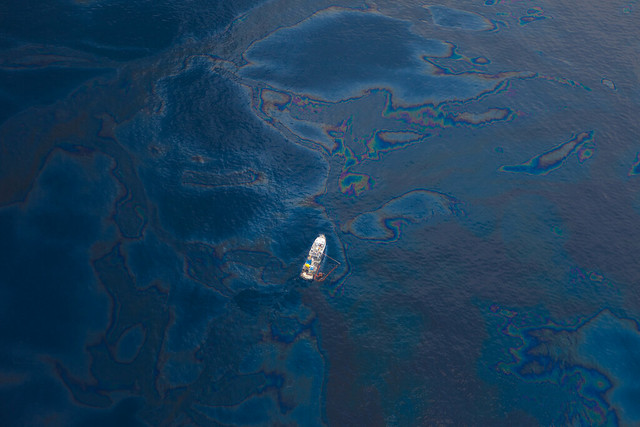The United States government cannot hope to arrive at a full accounting of the environmental destruction caused by the British Petroleum oil disaster in the Gulf of Mexico using its current methods, an expert panel has said.
 Photo by Kris KrugThe report digs into one of the great debates arising from the BP disaster: how to put a price on oiled coastlines, and marine animals, and how to hold the company accountable for restoration.
Photo by Kris KrugThe report digs into one of the great debates arising from the BP disaster: how to put a price on oiled coastlines, and marine animals, and how to hold the company accountable for restoration.
A report from the National Research Council said the US government’s efforts to put a price on damage from the April 2010 disaster failed to capture the full extent of the environmental and economic losses in Gulf waters and coastal areas, fisheries, marine life, and the deep sea caused by BP’s runaway well.
Compiled by a team of 16 scientists at the request of Congress, the study went on to call for a sweeping overhaul of methods for putting a price on environmental losses — especially after an event on the scale of the BP disaster.
“The full value of losses resulting from the spill cannot be captured … without consideration of changes in ecosystem services — the benefits delivered to society through natural processes,” the report said.
The experts involved in drafting the report said on Wednesday they believed their findings could still influence the settlement of environmental claims against BP brought by the federal government and five state governments.
But they conceded the report would probably carry greater weight in guiding future efforts to account for environmental damage.
It digs into one of the great debates arising from the BP disaster: how to put a price on oiled coastlines, and marine animals, and how to hold the company accountable for restoration.
The researchers noted that 20 million people in the US alone lived and worked around the Gulf of Mexico. Before the April 2010 disaster, the Gulf accounted for about a quarter of the country’s seafood catch. It also provided about 30 percent of America’s oil and nearly 20 percent of natural gas. Meanwhile, coastal wetlands provided protection against storm surges.
But the report noted: “Disruptions in the ecosystem caused by the oil spill could impair these services, leading to economic and social impacts that may not be apparent from an assessment of environmental damage alone.”
The April 2010 explosion killed 11 workers aboard the oil rig, and spewed more than 4m barrels of oil into the Gulf, according to the US government’s estimate. It was the worst offshore oil spill in US history.
BP says it has spent $25bn so far in clean-up and restoration costs. It owes the government an additional $4.5bn in fines. The company is also on the hook for an $8bn settlement of economic claims – a figure which is uncapped and growing.
BP could be facing even more expensive litigation in the autumn, involving fines of up to $17.5bn under the Clean Water Act.
Billions more hinge on the outcome of a trial involving claims by the federal government and five Gulf states for restoring damage to natural resources. Government scientists are now engaged in a closely guarded exercise of trying to get a full accounting of the damage done to the Gulf, and the cost of restoring oiled coastlines and waters, and protecting populations of marine wildlife, such as dolphins, which have suffered die-offs since the disaster.
However, the report said it was not possible to capture the full extent of that damage with current accounting methods, which focus on tallying up the restoration costs for individual resources rather than the ecosystem in its entirety.
Researchers have been trying since the BP spill to come up with a method that could account for the full magnitude of the disaster in the Gulf of Mexico.
The recommendations of the expert committee for an ecosystems-based approach were welcomed by Donald Boesch, president of the University of Maryland’s Centre for Environmental Science, who was a member of the White House commission on the BP oil spill.
“If you get stuck in the game of paying out 25 cents a crab for example, you are not really in a situation where you are understanding the broader impacts of the loss of that population,” he said.
Boesch also said that putting a valuation on the environment of the Gulf might also help prevent misuse of funds. A report last month from the Inspector General’s office in the Department of Interior found the state of Mississippi had mis-spent some $30m that had been designated for coastal restoration projects since 2007.
However, David Pettit, a senior attorney for the Natural Resources Defence Council, argued the approach devalued the environment. “It’s more human economy centred, and less centred in the idea that wild things and wild places have an inherent value – whether or not they make somebodies’ cash register ring,” he said.
We don’t have a paywall because, as a nonprofit publication, our mission is to inform, educate and inspire action to protect our living world. Which is why we rely on readers like you for support. If you believe in the work we do, please consider making a tax-deductible year-end donation to our Green Journalism Fund.
Donate